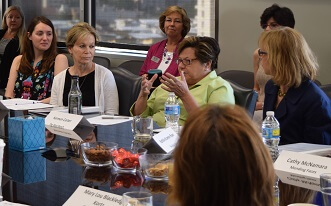Members of the endowment cohort share challenges
While few leaders of nonprofit organizations would dispute the value of having an endowment, it can be difficult to start one. Raising money for an endowment can feel like diverting operational dollars into a savings account. Once an organization makes the shift it can experience many dividends – long-term stability, increased operating income, and additional ways for donors to support the organization, including legacy gifts.
For many years, Rose Community Foundation has invested in the stability and longevity of Jewish nonprofits in the greater Denver community through programs like the Endowment Challenge and LiveOn! that provided both training and incentives for building an endowment fund. This year, the Philanthropic Services department is extending those models to a broader range of local nonprofit organizations, including arts and advocacy organizations. The group or cohort of twelve organizations also includes Rose Youth Foundation and the Latino Community Foundation of Colorado, both initiatives of the Foundation.
Helping nonprofits build endowments has been part of the work of Rose Community Foundation for over twelve years. This particular cohort is a great way to reach out and support important nonprofits in our community that may not be part of our regular grantmaking portfolio.
Each organization sends both a staff member and a board member to a series of trainings that span 12 months. The training sessions address how to raise money for an endowment fund and how to incorporate estate gifts along with endowment giving into an ongoing development plan. There is a popular myth that legacy and endowment campaigns cannibalize operational fundraising. In fact, the opposite is true. We work with organizations to help them understand how to successfully integrate these elements into their ongoing development strategy.
Heather McCallin, the assistant director of development at the Colorado Ballet, said that in terms of timing and incentives, the Endowment Cohort provided “a wonderful convergence” for undertaking an endowment campaign. The Colorado Ballet recently purchased and has nearly paid off a new building, and is doing well financially. An endowment is, says McCallin, “the next step that makes sense,” and will help the organization “provide stability in funding in perpetuity.”
She says participating in this cohort is attractive because of the expertise of the Rose Community Foundation staff. “It is so nice to be coached by someone who has set up a lot of these [endowments],” comments McCallin. “This will help us get things set up right the first time.” She goes on to say that participating in the cohort offers many helpful dimensions. “Someone will ask a question that I didn’t even know I should be asking.”
Mike Guthrie, the chief operating officer for the Carson J. Spencer Foundation echoed the feeling that participating in the cohort prompted his organization to implement an endowment fund, which the organization would not have pursued otherwise. “We are a small nonprofit with big goals,” he says. “But establishing an endowment wasn’t something we thought we were capable of, given the size and capacity of our organization.” The Carson J. Spencer Foundation works to prevent suicide and assist those coping with pain and grief resulting from a loss by suicide.
Guthrie says he now understands how having an endowment positions his organization differently for donors. “It provides a sense of permanence and makes clear that we have a long-term future,” he says. The organization’s development director, Monica Colbert adds that being able to make an estate gift will be particularly meaningful for many of the organization’s founding donors.
For Maya Brook, the executive director of Mending Faces, a nonprofit that provides surgical care to impoverished children in the Philippines with cleft lip and cleft palette, a valuable part of her participation in the cohort is working on an integrated development plan. “It has been a really good education for me and for the board,” she says. “We are so lucky to get this training.” Brook goes on to say she appreciates the accountability the cohort program provides, which has pushed her to devote time to her development plan and present it to her board. “We are already seeing results,” she says.
Participating organizations will receive a matching grant for putting what they learn into practice. In total, each organization is eligible for $10,000 in a matching grant. If they raise the amounts required for the match, they will begin their endowments with at least $25,000.

